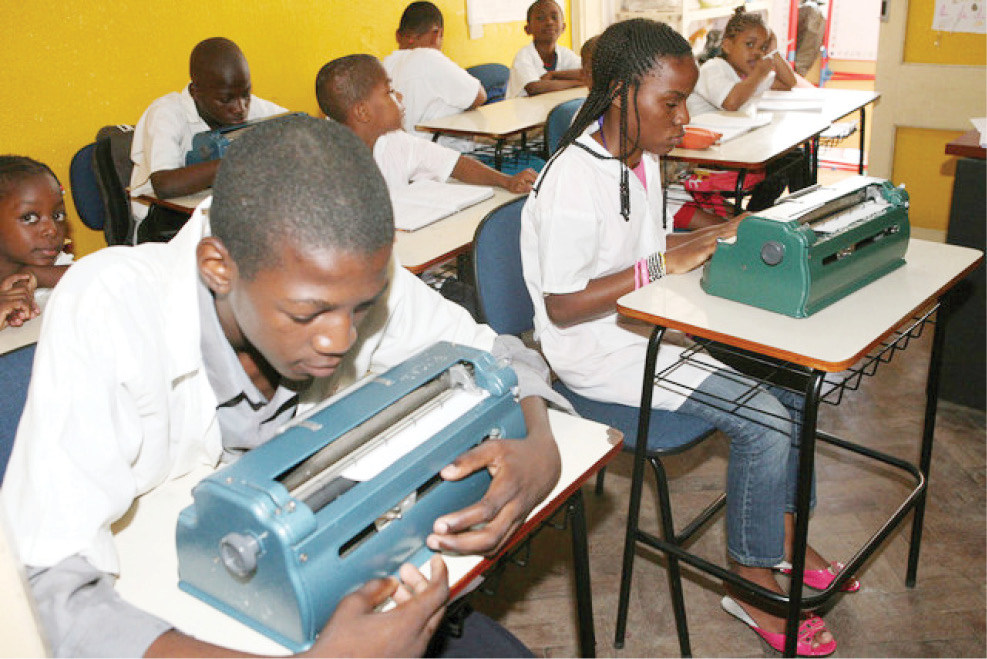Disability Act, key to achieving SDGs in Nigeria – Research Institute
The Africa Polling Institute (API), a non-profit research institute, has said that the domestication of the Discrimination Against Persons with Disability Act (2018), remained key to achieving the Sustainable Development Goals (SDGs) in Nigeria. The Institute made this known at the launch of the ‘National Disability Data in Nigeria Report’, on Thursday in Abuja. The […]

Some persons with disabilities in a classroom
The Africa Polling Institute (API), a non-profit research institute, has said that the domestication of the Discrimination Against Persons with Disability Act (2018), remained key to achieving the Sustainable Development Goals (SDGs) in Nigeria.
The Institute made this known at the launch of the ‘National Disability Data in Nigeria Report’, on Thursday in Abuja.
The report is a key component of the Nigeria Disability Research Project, carried out by API, in collaboration with the National Bureau of Statistics.
The project which had the support of the Ford Foundation was done to develop a reservoir of data on Persons with Disabilities (PWDs) in Nigeria.
Dr Olugbenga Ogunmefun, Acting Executive Director, API, said that the lack of data on PWDs had contributed to the various problems and challenges facing the group.
He added that to enhance the functionality and productivity of PWDs, deliberate efforts must be made towards domesticating the Act in all states and the FCT.
“In 2021 we had a grant from the Ford Foundation to go into the disability community to gather data and to have action research.
“Particularly as regards the domestication of the Disability Act as signed by President Muhammadu Buhari and we did that and we have four reports at the end of the whole exercise.
“The first is the Action Research which has to do with why states have not domesticated the Act, the challenges and differences in it.
“The second has to do with the sexual and gender-based violence and violence against people with disabilities.
“The other one is that we integrated indicators into the national survey carried out by the National Bureau of Statistics with over 56,000 sample size and we gathered the data.
“The last one is the tool formulated by our lead consultant, for use both within the public and private sectors to aid the inclusion of persons with disabilities.
“For the section on sexual and gender-based violence against persons with disabilities, for instance, we found that the violence is done by those closest to them.
“For the Action Research, there is a lack of political will for some states, as at the time we went into the field, we found out that only 13 states out of the 36 states and the FCT have domesticated the Act.
“We also found out from the data that there are so many inhibitions on the path of Nigerians that live with disabilities but the tool that we have developed is something that will enable MDAs and private institutions to make sure that there is inclusiveness for persons with disabilities,” he said.
Prof. Elias Wahab, Deputy Vice-Chancellor, Lagos State University and a Scholar on the project, said it was important for Nigeria to promote an inclusive society for all.
“Nigeria will gain a lot from this report because if we look at the SDGs, about five of them concern persons with disabilities.
“When we provide access to equal education for all Nigerians, irrespective of any form of disability, access to science and innovation, access to good employment, access to a quality way of life amongst others will be beneficial to Nigerians.
“The Federal Government should make sure other states domesticate the Act and once domesticated, implementation will make sure that people with disabilities are given their rights of place,” he said.
On his part, Dr Israel Balogun, Consultant to API, added that massive awareness about the plights of persons with disabilities must be made by the government.
